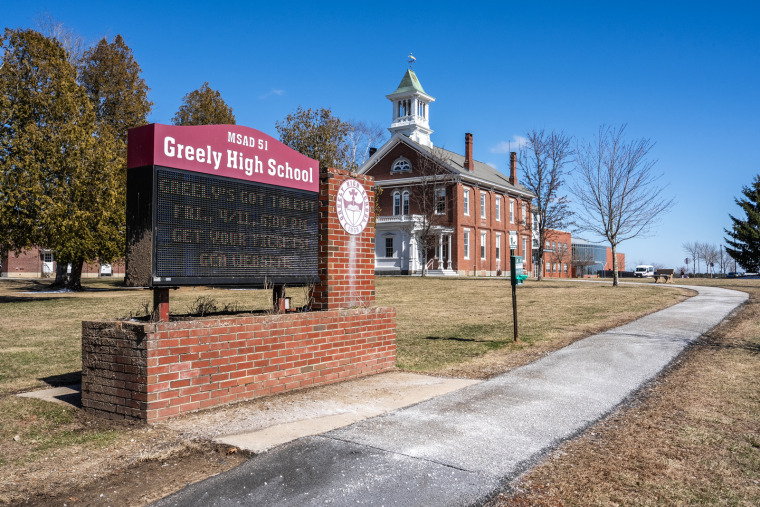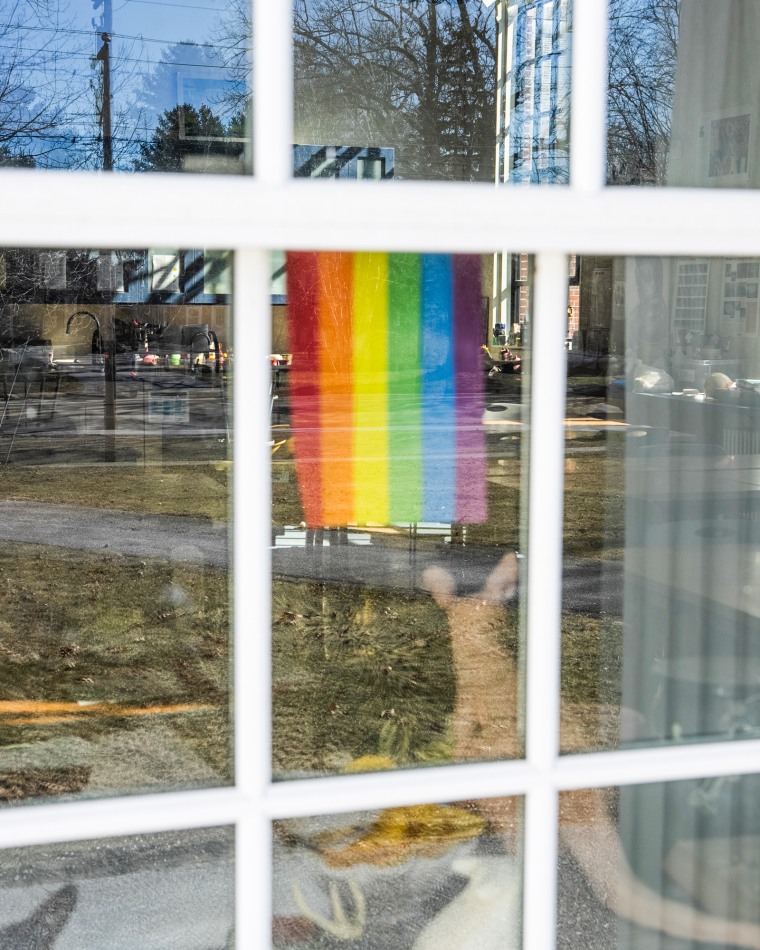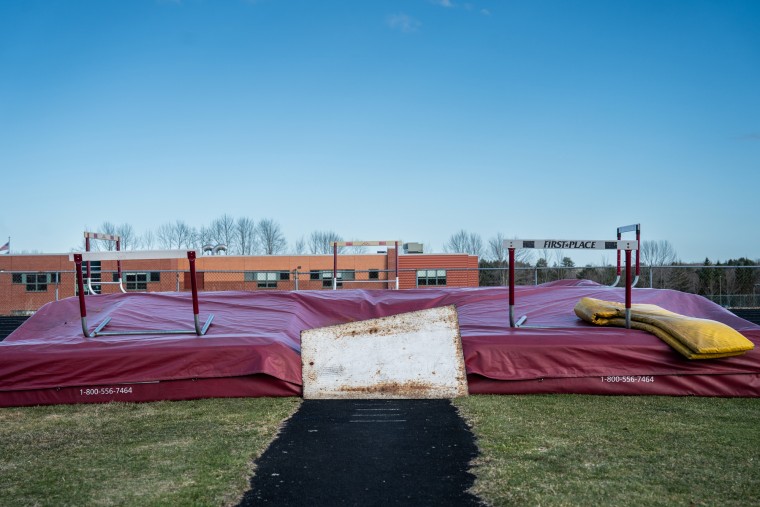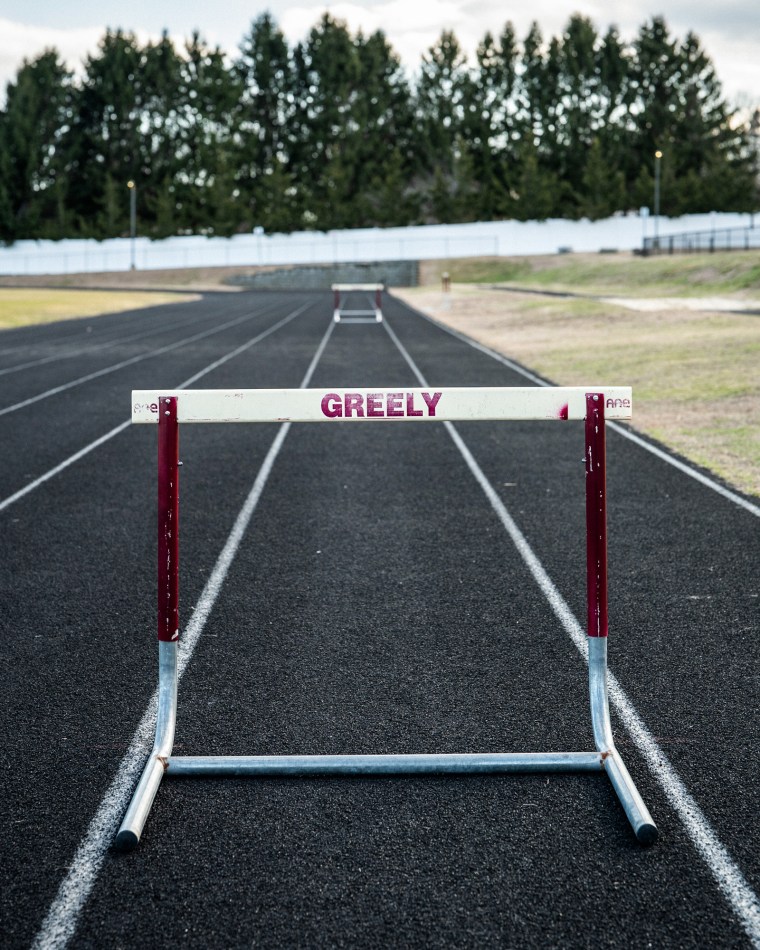It started with a track meet. A transgender girl on the Greely High School track team in Maine had won a pole-vaulting event, and a state politician took to Facebook to complain. The lawmaker not only circulated the girl’s name but included a side-by-side image of her competing in the boy’s division two years before.
As the Feb. 17 post went viral in conservative media, it drew the attention of the Trump administration, which had, in an executive order, effectively banned transgender students from participating in girls' and women's sports. President Donald Trump confronted Maine Gov. Janet Mills, a Democrat, demanding that her state comply with the order. She hasn’t agreed. And the school district hasn’t backed down.
Now Greely High School is at the center of a conflict over Title IX, the civil rights law that prohibits sex-based discrimination in education. On Friday, the Trump administration moved to pull all federal education funding — a major escalation risking over $200 million per year for Maine schools.
Outsiders see the showdown as an important test of how far the administration will go to force states to follow executive orders, as students and families at Greely High School brace for whatever comes next.

“We don’t know what is going to happen,” said Cora Berry, 16, a sophomore on the Greely track team who supports transgender students’ right to compete. “We’re getting what feels like hatred from high-ranking people in the government, and it’s coming down on kids who don’t really have much power and say.”
Madison Biedermann, a spokesperson for the U.S. Department of Education, said in a statement to NBC News that Maine could easily keep its federal dollars — if it agrees to bar transgender girls from female teams and locker rooms.
“Ultimately, if funding is terminated it is because Maine refuses to comply with a federal civil rights law that stands as a bulwark against unfair, harmful, discriminatory treatment of female students,” Biedermann said.
But for Gia Drew, executive director of EqualityMaine, an advocacy group, the debate goes far beyond Title IX.

“This is not about sports, this is not about fairness, this is not about girls and women,” Drew said. “This is about power and politics.”
Greely High School was first established in 1868 and has the old-fashioned schoolhouse to prove it. Located in affluent suburbs of Portland, it’s ranked as the best high school in the state by U.S. News & World Report. Described by several students and parents as a progressive, welcoming school, it hands out awards to “Open-Minded Students of the Month.”
After Trump’s executive order on transgender athletes, the district said it would follow state guidance and adhere to the Maine Human Rights Act by allowing a transgender athlete to compete on the team that matched her gender identity.

“Our obligation is to follow Maine law at this time,” Jeff Porter, the district’s superintendent, said in a recent statement. Neither he nor the school principal responded to interview requests.
At a Feb. 20 White House event for governors, days after Maine Rep. Laurel Libby (R-Auburn) posted on Facebook about the track meet, Trump singled out Mills and demanded to know whether Maine would follow his administration’s new interpretation of Title IX.
“You’d better do it,” Trump said, during the televised confrontation. “Because you’re not getting any federal funding at all if you don’t.” To which the governor replied, “We’ll see you in court.”
The next day, the U.S. Department of Education’s Office for Civil Rights opened an investigation into the Maine Department of Education and later expanded it to include Maine School Administrative District #51, the home of Greely High School.
Republicans and local conservative groups have cheered on the Trump administration, and some Maine students have said they feel transgender girls have an unfair advantage in sports.
“The overwhelming majority of Mainers support the protection of girls’ sports,” said Allen Sarvinas, Maine state director of the conservative group Parents’ Rights in Education. A recent poll found that more than half of Maine residents oppose letting transgender athletes compete on teams matching their gender identity.

Yet, many in the community support the school’s position. On March 4, the North Yarmouth Select Board, which represents part of Greely High School’s district, posted on Facebook to express its “unwavering support of LGBTQIA+ community members.”
“We affirm that all residents deserve to feel safe, valued, and included in our town and will do all we can to defend those rights,” the board wrote.
On March 23, several hundred people gathered across the street from Greely High to demonstrate on behalf of transgender students. Some held signs that read “See you in court.”
Vi Walsh, 17, a senior at Greely who identifies as queer, spoke at the rally. In an interview this week, she said some classmates and teachers have avoided discussing the situation at school and instead refer to it as “that thing that happened with the track meet” — either because they’re uncomfortable talking about it or to show respect for the athlete in question. But at the rally, she said, “it was so powerful to see how many people really care.”

“It’s kids’ sports, they’re having fun, they’re working towards something that they’re passionate about,” Walsh said, “and these adults decided to target a child — in what world is that acceptable?”
For the track team, it was particularly difficult, explained Cora Berry, the sophomore. The coach has done a good job keeping the team calm, and they avoid talking about it at practice, she said, but the focus on her teammate “made my blood boil.” Those on the track squad, she said, are “extremely accepting and just happy that everyone is trying to be who they are.”
“In a way, it feels like the entire team is being attacked,” she said.
The Trump administration’s feud with Maine quickly escalated after the confrontation in February, as the administration launched and in some cases rescinded seemingly punitive measures.
On the education front, the U.S. Department of Health and Human Services threatened to cut $180,000 in grants supporting people with disabilities in Maine. And weeks later, the U.S. Department of Agriculture froze $2.3 million that supports school breakfast and lunch programs in the state.

Last month, the Education Department finished its Title IX investigation without conducting any on-the-ground interviews, according to its spokesperson. In its letter of findings, the department cited several news stories about Greely High School as evidence Maine schools did not segregate single-sex sports. It subsequently gave the state until April 11 to change its policies on transgender athletes, warning that otherwise the federal agency would refer the case to the Department of Justice to begin the legal process of removing all its federal education funding.
Maine Attorney General Aaron Frey, who sued the Agriculture Department this week over the frozen school lunch funds, said the state will fight back in court. “I do worry that there are people out there who are like, ‘Well, why don’t you just do what the president’s telling you to do?’” he said. “I’m not in a position today where I feel it’s appropriate to disregard what is clear law to give him this win, because I don’t know where it stops.”
On Friday, Frey's office sent a letter to the Education Department affirming the state will not back down, because there are no Title IX regulations on the books that block schools from "allowing transgender girls and women to participate on girls’ and women’s sports teams."
In response, the department announced Friday it would initiate a legal proceeding to cut off K-12 education funding for Maine, including formula and discretionary grants that support impoverished children and those with disabilities. It's unclear how long this process will take.
“Governor Mills would have done well to adhere to the wisdom embedded in the old idiom — be careful what you wish for,” Craig Trainor, the department’s acting assistant secretary for civil rights, said in a statement. “Now she will see the Trump Administration in court.”
Though cutting all federal funding would be an extreme option — one almost never invoked against a state — the Trump administration has already shown a willingness to use unconventional means to fast-track sanctions against schools it believes are violating civil rights law, education experts say.

“I’ve never seen high stakes like this before,” said Brett Sokolow, president of the Association of Title IX Administrators. “I think both sides have potentially a lot to lose.”
But Sokolow said the government will need to explain in court how women were unable to compete fairly or excluded from teams or competition — neither of which was detailed in the investigation findings letter, he said. And if a federal judge sides against the administration, Sokolow continued, it could weaken the government's standing to pressure other states on similar transgender policies.
Keith Bubblo, the father of a Greely student, sees the Trump administration’s focus on their high school as misguided. “It’s been ridiculous — just that level of activity and intensity coming from the Justice Department, from Health and Human Services and the Department of Education,” he said. “Like the No. 1 thing they have to deal with is some kid on a track team in a tiny part of Maine?”


